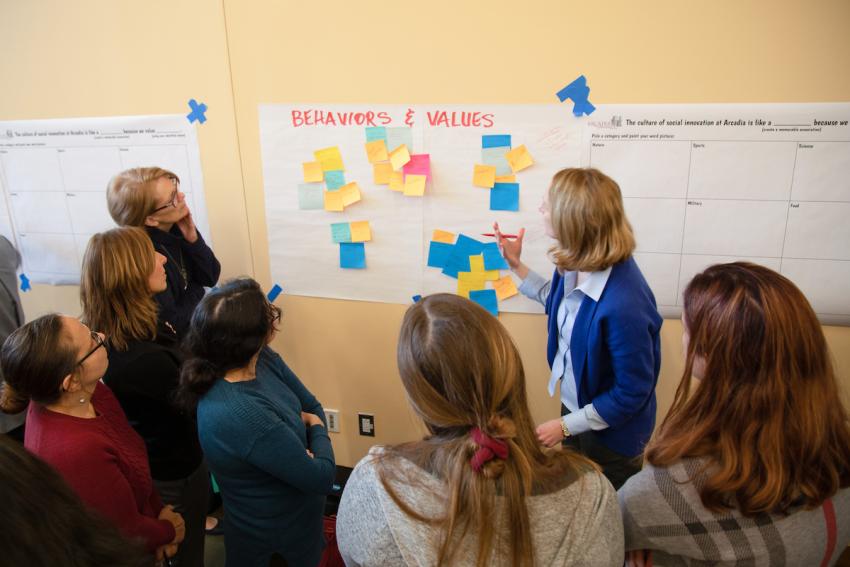Faculty, Staff, Students “UKnight” for Social Innovation and Freedom of Speech

Marissa Deitch leads a group in the social innovation exercise.
On Reading Day, Dec. 11, the University community heard from the UKnighted Budget, Aspirational, and Shared Governance and Transparency Committees in a highly anticipated follow-up to the April and September community-wide meetings.
In this third meeting, the Budget and Aspirational Committees presented their findings and recommendations, while the Shared Governance and Transparency Committee discussed what steps they would take in the spring semester. Attendees also learned about two newly established groups: the Open Expression and Social Innovation task forces.
Committee Updates
Dr. Peter Siskind, associate dean of the College of Arts and Sciences and assistant professor of Historical and Political Studies, presented on how the Budget Committee was charged with providing a working knowledge and clarity of a higher education budget to the University community. The committee will recommend to administration a more strategic, user-friendly, and proactive approach to communicating financial data to the community.
“These task forces emerged out of a difficult moment this spring, when a lot of people felt like they didn’t have enough information to understand why things were happening,” said Dr. Siskind.
The Aspirational Committee, presented by Carole Loeffler, chair and associate professor of Visual and Performing Arts, and Dr. Alison LaLond Wyant, associate dean for Teaching and Learning at The College of Global Studies, noted that much of the data they collected emphasized the importance of a student-centered university. Using thematic threads resonant across the data, the committee proposed a draft Vision Statement, which is available to review online. Feedback is open until the end of the semester.
“The two main charges were to look back and look forward– to collect information and data, see what things came from the past, and how it informs where we’re going in the future,” said Loeffler. “We want to make sure the [draft] reflects that work, and who we are and who we want to be.”
Breann Donnelly, assistant dean of students, and Dr. Ana Maria Garcia, associate professor of Sociology, Anthropology, and Criminal Justice, discussed how the Shared Governance and Transparency Committee is building a model in which student government, faculty senate, and staff council collaborate with administration. A draft of the shared governance structure and 10 principles will be drafted over winter break; the committee anticipates a review in January. Proposed principles of shared governance are interdependence, inclusiveness, transparency and communication, accountability, democratic, deliberative, consistent and collegiate, fairness, and recognition.
“These are the 10 principles that we think should guide how the University approaches shared governance,” said Donnelly. “If these principles are going to govern the way we work at Arcadia, you have to believe in them the same way that we do.”
Open Expression and Social Innovation
“We have two committees that have addressed and achieved their charges,” said Dr. Sandra Crenshaw, associate provost. “Now, we have two committees sliding in under the UKnighted banner to join this movement.”
The Open Expression Task Force, led by Andrew Goretsky, dean of students, examines the current climate of expression on college campuses. The committee will craft open expression guidelines for the University that will be presented to the community for discussion on Feb. 22. The task force also will examine the current open expression policies of Arcadia, and propose new policies as needed.
The Social Innovation Task Force, led by Loeffler and Dr. LaLond Wyant, will explore how Arcadia’s values can create an impact in the University communities, both in Glenside and around the world. Loeffler and Dr. LaLond Wyant said that this task force was developed based on the ideas collected by the aspirational committee.
“The most exciting thing that came out of the vision work was around a theme related to social innovation,” said Dr. LaLond Wyant. “This charge came from all of you [in the community]. As a result, we’re still deciding what that looks like as a task force.”
To explore the ideas and values of the University for social innovation, the community was led through an exercise by Jenny Trautman, founder and principal of Same Page People. The exercise identified behaviors exemplified by Arcadia’s current social innovators, in order to create a starting point for the task force to identify the principles the University considers most important. From those values, the community was asked to write a simile or metaphor that described how they view or would like to view the University. These descriptions included “gumbo,” because of its unique blend of ingredients that results in something flavorful; “21 Questions,” because it exemplifies curiosity; “astronaut,” because it signifies exploration; and “stamped passport,” to represent diversity, fearlessness, and grit.
Next, the task force will begin developing principles for common definitions and the overall charge of the group.


